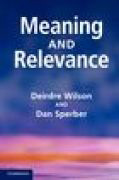
Enriches and updates relevance theory and explores its implications for linguistics, philosophy, cognitive science and literary studies. Wilson and Sperber argue that comprehension is a process of inference guided by precise expectations of relevance. This book enriches and updates relevance theory and explores its implications for linguistics, philosophy, cognitive science and literary studies. Wilson and Sperber argue that comprehension is a process of inference guided by precise expectations of relevance. This book enriches and updates relevance theory and explores its implications for linguistics, philosophy, cognitive science and literary studies. When people speak, their words never fully encode what they mean, and the context is always compatible with a variety of interpretations. How can comprehension ever be achieved? Wilson and Sperber argue that comprehension is a process of inference guided by precise expectations of relevance. What are the relations between the linguistically encodedmeanings studied in semantics and the thoughts that humans are capable of entertaining and conveying? How should we analyse literal meaning, approximations, metaphors and ironies? Is the ability to understand speakers' meanings rooted in a more general human ability to understand other minds? How do these abilities interact in evolution and in cognitive development? Meaning and Relevance sets out to answer these and other questions, enriching and updating relevance theory and exploring its implications for linguistics, philosophy, cognitive science and literary studies. Advance praise: 'â€a significantly expands upon [the authors'] groundbreaking 1986/1995 book Relevance: Communication and Cognition, and nicely situates relevance theory within contemporary developmentsin cognitive science â€a a masterful scholarly achievement that correctly places mind and relevance as the essential site for the scientific study of meaning and cognition.' Raymond W. Gibbs, Jr, University of California, Santa Cruz 'Wilson and Sperber are not merely the promoters of an influential framework in linguistic pragmatics, which this book beautifully illustrates; their pioneering work has implications for a wide range of disciplines, from evolutionary psychology to literary theory, and is of special interest to philosophers of language and mind.' FranÃoois Recanati, Institut Jean Nicod, CNRS, Paris 'Twenty-five years ago, Sperber and Wilson published Relevance, Communication and Cognition: this was a major breakthrough in pragmatics. Philosophers and cognitive scientists intrigued by the subtle mapping between concepts and words should delve right away into their new Meaning and Relevance.' Pierre Jacob, Institut Jean Nicod, CNRS, Paris INDICE: Introduction: 1. Pragmatics; Part I. Relevance and Meaning: 2. Themapping between the mental and the public lexicon; 3. Truthfulness and relevance; 4. Rhetoric and relevance; 5. A deflationary account of metaphors; 6. Explaining irony; Part II. Explicit and Implicit Communication: 7. Linguistic form and relevance; 8. Pragmatics and time; 9. Recent approaches to bridging: truth, coherence, relevance; 10. Mood and the analysis of non-declarative sentences; 11. Metarepresentation in linguistic communication; Part III. Cross-disciplinary Themes: 12. Pragmatics, modularity and mindreading; 13. Testing the cognitive and communicative principles of relevance; 14. The why and how of experimental pragmatics; 15. A pragmatic perspective on the evolution of language.
- ISBN: 978-0-521-76677-7
- Editorial: Cambridge University
- Encuadernacion: Cartoné
- Páginas: 396
- Fecha Publicación: 22/03/2012
- Nº Volúmenes: 1
- Idioma: Inglés
